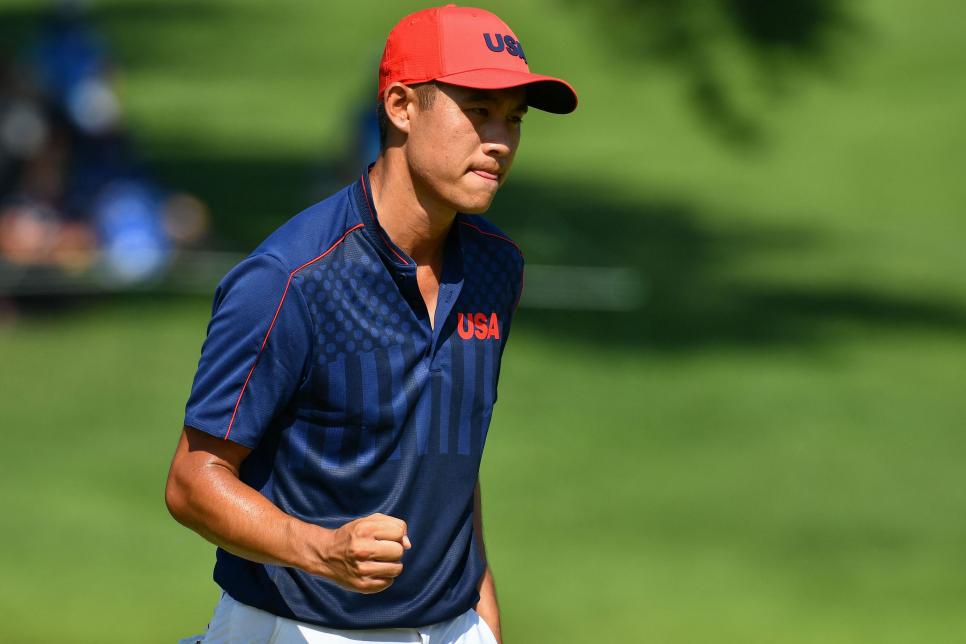KAZUHIRO NOGI
USA’s Collin Morikawa reacts after putting on the 18th green during the fourth round of the Tokyo Olympics.
By Shane Ryan
MEMPHIS, Tenn.—There are only three finishing spots that matter in Olympic golf, and when Collin Morikawa started his tournament in Tokyo with a 69-70, he was very far from any of them. It would have been easy to coast into a mid-20s or mid-30s finish and look ahead to this week’s WGC-St. Jude and the FedExCup Playoffs ahead.
It would have been even easier after a third-round 67, which improved his position marginally but not enough, it seemed, to have a realistic hope for a medal. It’s not like a normal tour event, where a higher finish means more prize money and there’s always, in theory, something to play for. The incentives, outside the medals, are few and far between.
But instead of letting complacency take over, Morikawa continued to push, and something remarkable happened in that final round. With a 63, he made a heroic push for a medal and found himself at round’s end in a tiebreaker for the bronze with six other golfers, including Rory McIlroy. History may not remember Morikawa’s effort, because after out-dueling three of his competitors, he finally lost to C.T. Pan on the third playoff hole and came up one spot shy of a medal. But it mattered to Morikawa.
“I think how I played last week at the Olympics really showed that it was a full reset,” he said Wednesday morning in Memphis. “I could have packed my bags in after that first couple days … but I really fought. I thought I was grinding and that’s what I didn’t have after the PGA win. I wasn’t grinding as much because I just kind of had standards that I thought I would start playing better just because I won a major and that doesn’t happen like that.”
The PGA, of course, refers to his first major victory at the PGA Championship in 2020, and when he talks about a “full reset,” he’s referring to how he moves on from winning his second major—this year’s Open Championship at Royal St. George’s. The fact is, like many young golfers, Morikawa wasn’t exactly sure how to react after that first win, and it segued into a mini slump. A quick look at his results afterward shows a few highly uncharacteristic missed cuts—this is a guy who started his career with 22 straight made cuts, a number only exceeded among new pros by Tiger’s 25 straight—and some mediocre finishes in the fall and early spring.
At 24, Morikawa is the youngest man to win two majors, and he’s keenly aware of both what that might portend for his career and how quickly it can slip away.
“I want more,” he said. “I can’t live in that moment of just being called the Champion Golfer of the Year for the next year because if I do, I could blink and we could be at next year’s Open Championship already and me not having done things that I want to complete.”
It’s a remarkable show of maturity, which should be no surprise considering that the word most often used to describe him, especially by peers like Viktor Hovland and Matthew Wolff, is “mature.” But despite his wisdom, he still needed to learn the lesson of how to react after achieving so much success so soon. He hasn’t been shy about owning up to his lack of focus following that PGA Championship win at Harding Park, and the mental aspect of adjusting to another major victory with increased purpose is part of what’s different this time around.
There’s something else, too, and something far more practical: putting. When asked about his relatively low ranking in the strokes gained/putting metric in his last two years on tour—128th last year, 166th this year—he pointed to changes he made that, in his mind, have started a total turnaround.
“Obviously I don’t want to be 160-something on the PGA TOUR in putting,” he said, “but I think I did such bad damage throughout that fall and beginning part. I was three-putting at least once per round. Once I kind of hit midway through the spring, I really didn’t care about that stat. I didn’t care what people were saying because I wanted to figure out what I need to do better, and I figured that out in L.A. or right before L.A. at the Genesis. I switched to that saw grip with the help of Mark O’Meara. I made strides … overall I knew I was doing something for the better, I was helping myself, I was finding a little more consistency.”
And as he noted, when it came time to make clutch putts in huge situations, whether at the WGC-Workday Championship in the spring or at Royal St. George’s in July, he was ready and able to knock them in.
Last year here in Memphis, he finished in a tie for 20th just before going to San Francisco and winning his first major. He’s been through a career’s worth of ups and downs since, and it’s easy to forget that it’s only been a year. The mark of a great player is the ability to learn, and learn quickly, and Morikawa comes into the closing stretch of 2021 armed with a better perspective and a better battle plan—physically and mentally—following the second crowning triumph of his career.
The bronze medal may have eluded him in Tokyo, but his effort in the closing stretch was a harbinger of things to come. He lost track after his first major, but he’s not going to make the same mistake twice. That kind of self-awareness and sharp competitive instinct is a lethal combination, and if his contemporaries don’t look at that with a lot of wonder and a little bit of fear, they probably should.









